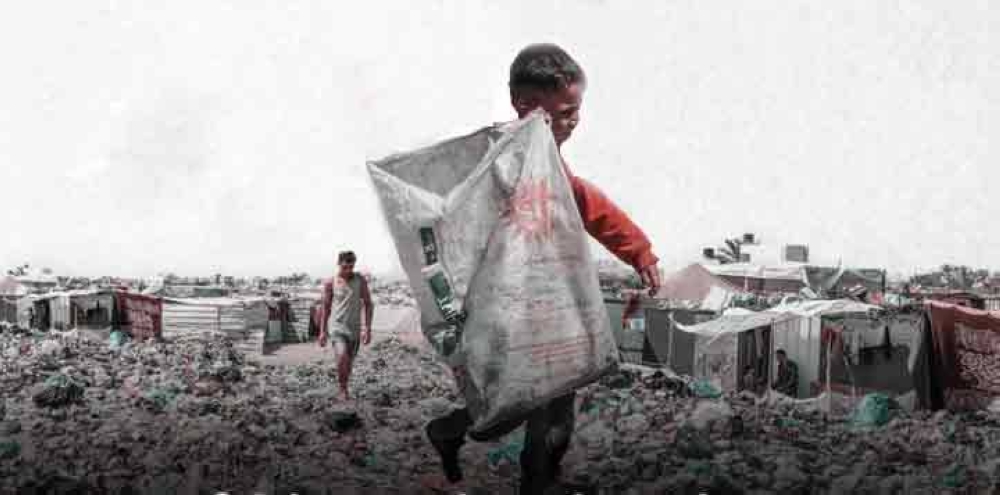Deputy Special Representative of United Nations Development Program's (UNDP) Program of Assistance to the Palestinian People Chitose Noguchi warned of the deterioration of health crisis in the Gaza Strip, highlighting that there are more than a million people who are affected by hepatitis and diarrhea diseases, in addition to the increasing cases of poliomyelitis caused by the contamination of wastewater.
Speaking to Qatar News Agency (QNA), Noguchi added that the situation in the Gaza Strip is extremely critical, given the crumbling system of solid waste management in a multiple ways, as waste are not collected and dumped in their designated areas such as landfills, thus leading to the emergence of over 140 emergency or interim sites for the purpose of dumping waste across the Strip, as well as the severe shortages of vehicle to transport the waste, because there were only 50 out of the 250 vehicles available before the war broke out.
She affirmed that UNDP is not capable of reaching out to numerous sites in the Gaza Strip to transport the waste, even metal containers were not distributed to multiple areas of the Strip either, due to the current conditions, pointing out that there are many lingering challenges that impede access to solid waste to be further transferred to the northern or southern of the Strip, as Israel does not approve these measures, or using essential vehicle to transport the waste, something that precludes the entire operation of UNDP.
Noguchi noted the emergence of numerous and vexing challenges in the Strip, such as medical waste that are difficult to be correctly treated or disposed, portending the emergence of a multitude of health problems in the future. She outlined that all these challenges are in fact a result of the situation in which the solid waste management system has collapsed.
Noguchi elucidated that the program is currently collaborating with the Joint Service Council for Solid Waste Management and private sector in the Strip to collect waste from emergency waste dumping sites close to people, so as to move them to a more distant site, and provide the necessary fuel to operate three-wheeled trucks for waste transport.
Noguchi emphasised that fuel is an extremely sensitive material in Gaza, as UNDP has set a robust surveillance system there through deploying 49 fuel monitors to ensure utilizing this fuel for the designated purposes, in addition to 140 workers who have been deployed through the program to be able to support the Joint Service Council.
She highlighted that the volume of waste that have, heretofore, been collected since the start of the war reached roughly 90,000 tons where 680 tons of waste are collected on daily basis. However, she underlined that these measures are not enough due to the miserable situation there, along with the perilous health crisis facing the Strip.
Additionally, Noguchi pointed out that there are many people in Gaza who suffer from skin diseases as a result of the crumbling waste management system, amid a panoply of challenges that prevent addressing this situation under the current conditions. She called for addressing this health crisis preemptively which essentially requires advanced level of humanitarian response through expanding the UNDP's activities to set appropriate remediation measures.
Noguchi asserted that during her recent visit to the Gaza Strip she witnessed large garbage mountains that accumulated waste, where many displaced people live in adjacent to these waste piles, underscoring the precarious situation for individuals, who are indeed suffering from skin diseases and liver infections, as well as the lack of clean drinking water.
She stated that UNDP strives to either treat waste in their designated areas or transport them to various sites in the Gaza Strip, as UNDP had been focusing on bolstering the solid waste management system in Gaza before the war broke out, emphasizing that the program is mulling a road map that strengthens the institutional capability to treat multiple types of waste.
Noguchi highlighted that UNDP has worked in lockstep with the Joint Service Council, which consists of several municipalities, the private sector, other entities, and partners, to develop a strategy for solid waste management in the enclave. This strategy includes waste separation for recycling, using equipment and technical tools to handle medical waste in the north and south, among other measures.
Noguchi continued by saying to QNA that prior to the war, the number of heavy vehicles for waste transportation was 10 and now there is no heavy vehicle to transport it. As for the waste collection containers, there were 7,300 containers before the war and now there are only 1,300, while the number of landfill machinery units decreased from 18 units to two units.
Before the war, there were 5 medical waste collection vehicles and now only one is working, while the number of medical waste sterilization devices was 12 and now only one is working, in addition to the destruction and damage of all the microwave devices needed to sterilize medical waste, she stated, describing this situation as "extremely destructive."
She added that the infection of more than one million people in the Gaza Strip with many diseases such as hepatitis, diarrhea and other diseases constitutes a dangerous situation that requires addressing, given its significant impact on societies in the long term, pointing to the great destruction that occurred to the water and sanitation infrastructure because of the war.
Noguchi warned that the suffering is not limited to the accumulation of solid waste and failure to handle it, but also to the collapse of the entire water and sewage systems as well as the presence of sewage ponds next to residential areas and food stores.
She noted that the UNDP had established many sewage treatment facilities in various parts of the Gaza Strip, but the war had destroyed these facilities, noting that the current situation requires ensuring the restoration of this infrastructure to prevent the spread and exacerbation of the health crisis.
While pointing to contact made with many donors, countries and partners to support solid waste management in the sector, she noted the need to support these efforts to prevent the continued spread of health crises in Gaza.
Noguchi concluded her interview with QNA by stressing that all the current work being done comes from the resources available to the program, calling on the international community to address the health crisis in the Gaza Strip, especially since its impact on the lives and health of individuals continues over the long term.


Chitose Noguchi
